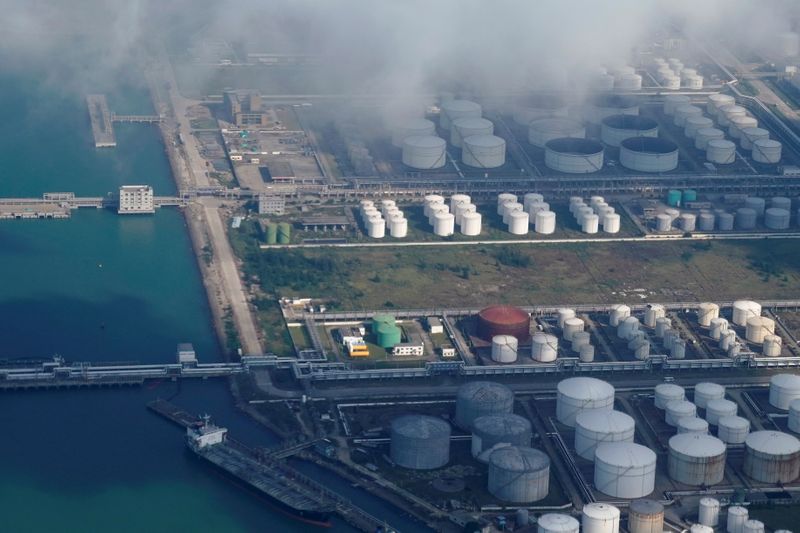
© Reuters. FILE PHOTO: Oil and gas tanks are seen at an oil warehouse at a port in Zhuhai, China October 22, 2018. REUTERS/Aly Song/File Photo
By Ron Bousso
LONDON (Reuters) – Oil prices fell sharply on Friday towards $78 a barrel as a fresh surge in COVID-19 cases in Europe threatened to slow the economic recovery while investors also weighed a potential release of crude reserves by major economies to cool prices.
Brent crude was down $2.78, or 3.42%, at $78.46 a barrel by 1300 GMT, its lowest since early October, after earlier rising to as high as $82.24, extending volatility seen on Thursday.
U.S. West Texas Intermediate (WTI) crude for December delivery was down $2.61, or 3.3%, at $76.40 a barrel.
The WTI December contract expires on Friday and most trading activity has shifted to the January future, which was down 3.3% at $75.83 a barrel.
Both Brent and WTI are set for a fourth week of declines.
Austria became the first country in western Europe to reimpose a full coronavirus lockdown this autumn to tackle a new wave of COVID-19 infections across the region that threatens to slow the recent months’ economic recovery.
Germany, Europe’s largest economy, warned it may also have to move to a full COVID-19 lockdown.
Brent has surged almost 60% this year as economies bounce back from the pandemic and the Organization of the Petroleum Exporting Countries (OPEC) and allies, known as OPEC+, have only raised output gradually.
“The (oil) market still remains fundamentally in a good position but lockdowns are now an obvious risk… if other countries follow Austria’s lead,” Craig Erlam, market analyst at OANDA, said in a note.
Governments from some of the world’s biggest economies were looking into releasing oil from their strategic petroleum reserves (SPR) following a request from the United States, first reported by Reuters https://www.reuters.com/business/energy/exclusive-us-asks-big-countries-coordinate-releases-oil-reserves-sources-2021-11-17, for a coordinated move to cool prices.
Speculation about a U.S. stock release has already pushed oil prices down by about $4 a barrel in recent weeks and additional supplies of up to 100 million barrels are already priced in, Goldman Sachs (NYSE:GS) oil analysts said in a note.
As a result, it said any release “would only provide a short-term fix to a structural deficit”.
OPEC+ has stuck to its policy of gradual oil output increases even as prices surged, saying it expects supply to outpace demand in the first months of 2022.
Source: Investing.com



























